Denpasar, the bustling capital of Bali, is a captivating city that seamlessly blends rich cultural heritage with modern urban development. From its ancient temples and vibrant festivals to its thriving economy and diverse population, Denpasar offers a unique and unforgettable experience for visitors and locals alike.
As we delve into the heart of Denpasar, we’ll explore its cultural tapestry, economic landscape, urban transformation, social fabric, tourism industry, transportation infrastructure, environmental challenges, and future aspirations. Get ready to embark on a journey that will unveil the multifaceted魅力 of this dynamic city.
Denpasar’s Cultural Heritage
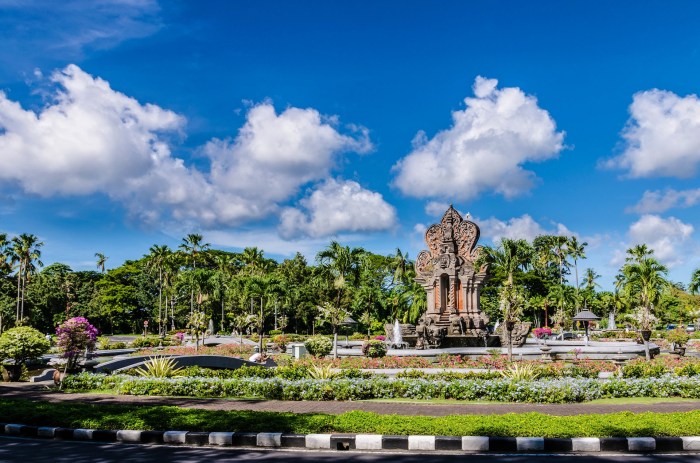
Denpasar is a city with a rich cultural heritage, boasting unique traditions and art forms that have been passed down through generations. The city’s cultural identity is deeply rooted in its history, with influences from various ethnic groups and religions.
Denpasar’s cultural heritage is evident in its traditional ceremonies, festivals, and art forms. These practices have historical significance and have evolved over time to reflect the city’s changing social and cultural landscape.
Traditional Ceremonies, Denpasar
Traditional ceremonies play a significant role in Denpasar’s cultural heritage. These ceremonies are often associated with religious festivals and mark important life events such as birth, marriage, and death.
- Ngaben:Ngaben is a cremation ceremony that is considered one of the most important ceremonies in Balinese Hinduism. It is believed that through Ngaben, the soul of the deceased is released from the body and can ascend to heaven.
- Melasti:Melasti is a purification ceremony that takes place before Nyepi, the Balinese Day of Silence. During Melasti, sacred objects from temples are taken to the beach or other bodies of water for purification.
Traditional Festivals
Denpasar is known for its vibrant traditional festivals that showcase the city’s rich cultural heritage. These festivals are often associated with specific seasons or religious events.
- Galungan:Galungan is a major Balinese festival that celebrates the victory of good over evil. It is celebrated over a ten-day period and features colorful processions, traditional dances, and music.
- Kuningan:Kuningan is a festival that marks the end of Galungan. It is believed that during Kuningan, the spirits of the ancestors return to the earth.
Traditional Art Forms
Denpasar is home to a variety of traditional art forms that reflect the city’s rich cultural heritage. These art forms include dance, music, and painting.
- Legong:Legong is a classical Balinese dance that is characterized by its graceful movements and intricate costumes. It is often performed at temples and other special occasions.
- Kecak:Kecak is a traditional Balinese dance that is performed by a group of men who chant and clap in rhythm. It is often performed at temples and other cultural events.
Denpasar’s Economic Landscape

Denpasar’s economy is a vibrant and diverse one, driven by a range of industries. The city is a major center for tourism, trade, and manufacturing, and its strategic location has played a significant role in its economic development.
Tourism
Tourism is one of the most important industries in Denpasar. The city is a popular destination for both domestic and international tourists, who are drawn to its beautiful beaches, cultural attractions, and shopping opportunities. The tourism industry provides employment for a large number of people in Denpasar, and it is a major source of revenue for the city.
Trade
Denpasar is also a major center for trade. The city is home to a number of large shopping malls and markets, and it is a major hub for the distribution of goods throughout Bali. The trade industry provides employment for a large number of people in Denpasar, and it is a major source of revenue for the city.
Manufacturing
Manufacturing is another important industry in Denpasar. The city is home to a number of factories that produce a wide range of goods, including textiles, furniture, and electronics. The manufacturing industry provides employment for a large number of people in Denpasar, and it is a major source of revenue for the city.
Strategic Location
Denpasar’s strategic location has played a significant role in its economic development. The city is located on the southern coast of Bali, and it is the main gateway to the island. This has made Denpasar a major hub for trade and tourism, and it has also attracted a number of businesses to the city.
Denpasar’s Urban Development
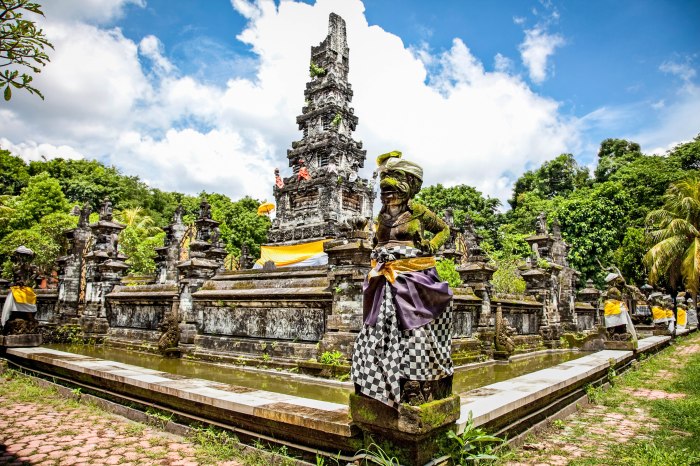
Denpasar has undergone significant urban planning and development in recent years, driven by its rapid urbanization and growing economic importance. The city’s urban development strategies aim to create a sustainable, resilient, and inclusive urban environment that supports economic growth and improves the quality of life for its residents.
One of the key challenges facing Denpasar is managing its rapid urbanization. The city’s population has grown rapidly in recent years, and this growth is expected to continue in the coming years. This has put a strain on the city’s infrastructure and services, and has led to increased traffic congestion, pollution, and other urban problems.
Despite these challenges, Denpasar has also experienced significant opportunities as a result of its rapid urbanization. The city has attracted investment from both domestic and international sources, and this investment has helped to fuel economic growth and create new jobs.
Denpasar has also become a major center for education, culture, and tourism.
Architectural Styles and Landmarks
Denpasar’s cityscape is a blend of traditional Balinese architecture and modern international styles. Traditional Balinese architecture is characterized by its use of natural materials, such as wood, stone, and bamboo, and its intricate carvings and decorations. Modern international styles, such as Art Deco and Bauhaus, are also evident in Denpasar’s architecture, particularly in the city’s central business district.
Some of the most notable architectural landmarks in Denpasar include the Pura Jagatnatha, the Bali Museum, and the Bajra Sandhi Monument. The Pura Jagatnatha is a Hindu temple that is considered to be the most important temple in Denpasar. The Bali Museum houses a collection of Balinese art and artifacts, and the Bajra Sandhi Monument commemorates the Balinese struggle for independence.
Denpasar’s Social and Cultural Fabric
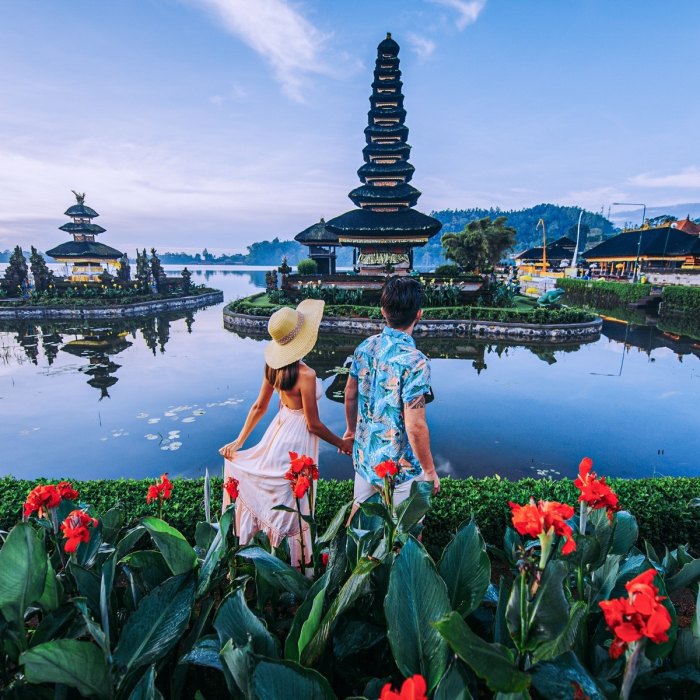
Denpasar is a melting pot of cultures, with a diverse population that reflects the city’s rich history. The indigenous Balinese community forms the majority, but significant Chinese, Javanese, and other ethnic groups also call Denpasar home. This diversity has shaped the city’s social and cultural landscape, creating a vibrant and dynamic environment.
The Balinese culture is deeply rooted in Hinduism and animism, and its influence is evident throughout Denpasar. Traditional ceremonies, festivals, and rituals are an integral part of the city’s life, and the streets are often adorned with colorful decorations and offerings.
Denpasar, the vibrant capital of Bali, boasts a rich cultural heritage and stunning beaches. While exploring Denpasar, one can venture to the neighboring city of Harapan Indah Bekasi , renowned for its modern urban planning and expansive green spaces. The serene atmosphere and lush surroundings of Harapan Indah Bekasi provide a refreshing contrast to the bustling streets of Denpasar, offering a tranquil escape amidst the city’s energy.
The Balinese are known for their hospitality and warmth, and visitors are often welcomed with open arms.
Ethnic Influences
The Chinese community has played a significant role in Denpasar’s economic and cultural development. Many Chinese immigrants settled in the city during the 19th century, and their influence is still visible today in the city’s architecture, cuisine, and traditions. The Chinese New Year is celebrated with great fanfare in Denpasar, and Chinese temples can be found throughout the city.
The Javanese community is another important ethnic group in Denpasar. Many Javanese migrated to Bali during the Majapahit Empire, and their influence can be seen in the city’s language, art, and music. The Javanese language is widely spoken in Denpasar, and Javanese gamelan music is often performed at traditional ceremonies and festivals.
Social Challenges and Opportunities
Like any major city, Denpasar faces its share of social challenges. Traffic congestion, pollution, and poverty are all issues that the city must address. However, Denpasar also has a number of opportunities to improve the lives of its residents. The city’s strong economy and cultural heritage provide a foundation for sustainable development, and there is a growing movement to promote social justice and environmental protection.
Denpasar’s Tourism and Hospitality
Denpasar’s vibrant tourism industry is a significant contributor to its economic growth and development. The city’s rich cultural heritage, stunning beaches, and diverse attractions draw tourists from around the world.
Among Denpasar’s major tourist attractions are the Jagatnatha Temple, a magnificent Hindu temple known for its intricate architecture; the Bali Museum, which houses a vast collection of Balinese artifacts and cultural treasures; and the Sanur Beach, a popular destination for sunbathing, swimming, and water sports.
Tourist Infrastructure and Services
To support its tourism industry, Denpasar boasts a well-developed infrastructure and a wide range of services. The city’s Ngurah Rai International Airport provides convenient access for international travelers, while a network of roads and public transportation connects tourists to major attractions and destinations.
Denpasar offers a variety of accommodation options, from budget-friendly guesthouses to luxurious resorts. The city also has a thriving culinary scene, with restaurants serving traditional Balinese cuisine as well as international fare.
Denpasar’s Transportation and Infrastructure
Denpasar’s transportation system is a crucial aspect of the city’s infrastructure, enabling mobility, economic development, and social interactions. The city boasts a comprehensive network of roads, public transportation options, and air connectivity, catering to the needs of its residents and visitors.
Road Networks
Denpasar’s road network forms the backbone of its transportation system. The city is crisscrossed by a grid of major thoroughfares, including Jalan Raya Puputan, Jalan Diponegoro, and Jalan Gajah Mada. These arterial roads connect Denpasar to neighboring areas and facilitate the flow of traffic within the city.
Public Transportation
Denpasar has a well-developed public transportation system that includes buses, minibuses, and taxis. The city’s bus network is operated by Perum DAMRI and provides affordable and convenient transportation throughout Denpasar and its surrounding areas. Minibuses, locally known as bemo, offer a more flexible and frequent service, connecting neighborhoods and popular destinations.
Air Connectivity
Denpasar is the gateway to Bali through its international airport, Ngurah Rai International Airport (DPS). The airport is located about 13 kilometers south of the city center and serves as a major hub for both domestic and international flights. It handles millions of passengers annually, connecting Denpasar to destinations across Indonesia and around the world.
Challenges and Opportunities
While Denpasar’s transportation system is generally robust, there are challenges and opportunities for improvement. Traffic congestion, particularly during peak hours, is a persistent issue. The city is exploring measures to alleviate congestion, such as implementing traffic management systems, expanding public transportation capacity, and promoting alternative modes of transportation.
Another challenge is the need for improved connectivity between Denpasar and neighboring areas. The city is working to enhance road infrastructure and public transportation links to facilitate seamless movement of people and goods within the Greater Denpasar region.
Impact on Economic and Social Development
Denpasar’s transportation infrastructure plays a vital role in the city’s economic and social development. Efficient transportation enables businesses to move goods and services, facilitating economic growth and job creation. It also enhances accessibility to education, healthcare, and other essential services, improving the quality of life for residents.
Public transportation and pedestrian-friendly infrastructure promote social interactions and community building. By providing affordable and convenient transportation options, the city encourages inclusivity and makes it easier for people to connect with each other.
Denpasar’s Environmental Sustainability
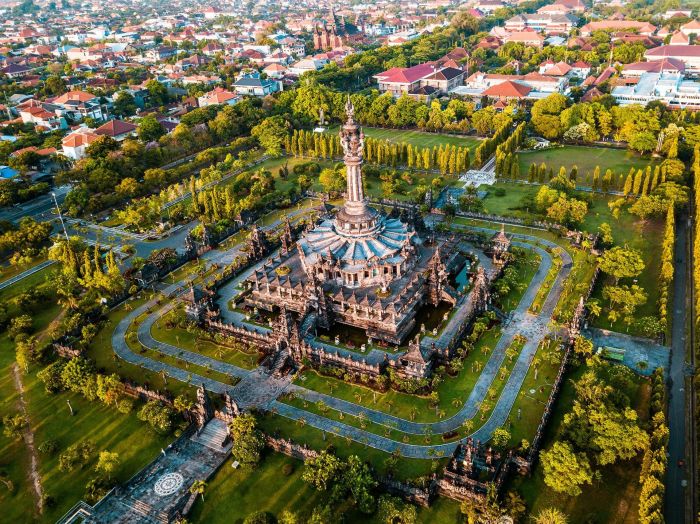
Denpasar, the capital city of Bali, faces significant environmental challenges, including pollution, waste management, and climate change. The city’s rapid urbanization and economic growth have contributed to increased air and water pollution, as well as the generation of vast amounts of waste.
Denpasar, the bustling capital of Bali, offers a myriad of attractions for visitors. From vibrant cultural landmarks to stunning beaches, there’s something for everyone. For those seeking a day of relaxation and indulgence, Sundays Beach Club is an oasis of luxury.
Nestled along the picturesque shores of Nusa Dua, this exclusive retreat offers an unforgettable beach club experience. From its chic infinity pool and gourmet dining to its world-class DJs and live entertainment, Sundays Beach Club is the perfect destination to unwind and embrace the vibrant energy of Denpasar.
Climate change poses a significant threat to Denpasar, as rising sea levels and extreme weather events are becoming more frequent.
Denpasar, the capital of Bali, is a vibrant city that offers a rich blend of culture, history, and natural beauty. It is also home to Ngurah Rai International Airport DPS , the main gateway to the island. From the airport, visitors can easily access Denpasar’s many attractions, including its stunning beaches, ancient temples, and bustling markets.
Environmental Initiatives and Strategies
Denpasar has implemented several initiatives and strategies to promote environmental sustainability. These include:
- Establishing a comprehensive waste management system that includes waste reduction, recycling, and composting programs.
- Investing in renewable energy sources, such as solar and geothermal energy, to reduce greenhouse gas emissions.
- Promoting sustainable transportation options, such as public transportation, cycling, and walking.
- Implementing green building codes and promoting energy-efficient practices in new construction and renovations.
- Raising public awareness about environmental issues and encouraging community involvement in environmental protection efforts.
Role of Local Communities and Businesses
Local communities and businesses play a crucial role in protecting Denpasar’s environment. Community groups have organized clean-up campaigns, recycling drives, and tree-planting initiatives. Businesses have adopted sustainable practices, such as reducing energy consumption, using recycled materials, and implementing waste reduction programs.
By working together, local communities and businesses can help to create a more sustainable and environmentally friendly Denpasar.
Denpasar’s Future Prospects
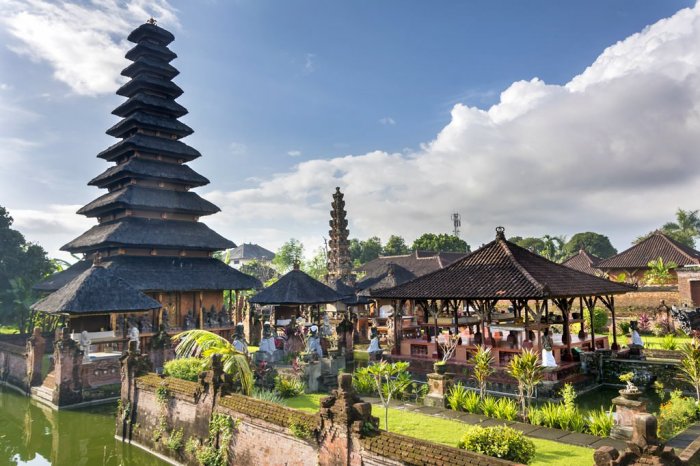
Denpasar, as the capital city of Bali, has a bright future ahead. With its strategic location, rich cultural heritage, and growing economy, Denpasar is poised to become a leading urban center in Indonesia and Southeast Asia. The city has ambitious plans for the future, including developing its tourism sector, improving its infrastructure, and promoting sustainable development.
Economic Growth
Denpasar’s economy is expected to continue to grow in the coming years. The city is a major center for tourism, trade, and finance. The government is investing in infrastructure and education to support economic growth. Denpasar is also home to a number of startups and small businesses.
Closing Summary
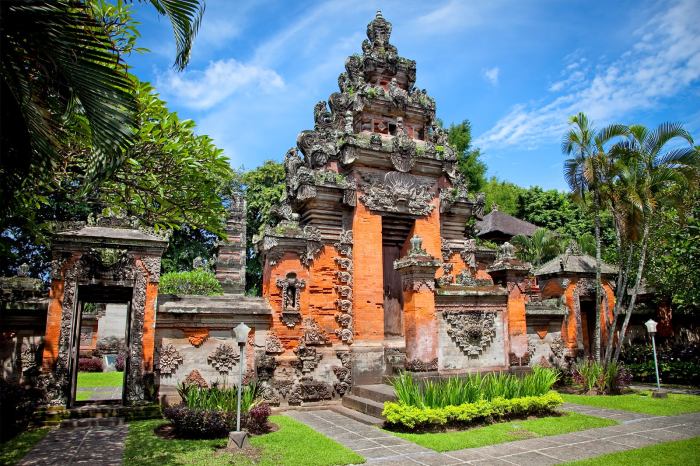
Denpasar stands as a testament to the harmonious coexistence of tradition and progress. Its cultural heritage, economic vitality, and urban development paint a vibrant portrait of a city that embraces its past while confidently striding towards the future. As Denpasar continues to evolve, it holds the promise of remaining a thriving cultural hub and a beacon of sustainable urban living in the years to come.
Common Queries
What is Denpasar known for?
Denpasar is renowned for its rich cultural heritage, vibrant festivals, and traditional art forms, such as dance, music, and painting.
What is the economic significance of Denpasar?
Denpasar serves as the economic hub of Bali, with tourism, trade, and manufacturing playing major roles in its economy. Its strategic location has contributed to its economic growth and development.
How is Denpasar addressing environmental challenges?
Denpasar has implemented initiatives to promote environmental sustainability, including waste management programs, pollution reduction measures, and the promotion of renewable energy sources.